Deck 13: Functions of Several Variables
سؤال
سؤال
سؤال
سؤال
سؤال
سؤال
سؤال
سؤال
سؤال
سؤال
سؤال
سؤال
سؤال
سؤال
سؤال
سؤال
سؤال
سؤال
سؤال
سؤال
سؤال
سؤال
سؤال
سؤال
سؤال
سؤال
سؤال
سؤال
سؤال
سؤال
سؤال
سؤال
سؤال
سؤال
سؤال
سؤال
سؤال
سؤال
سؤال
سؤال
سؤال
سؤال
سؤال
سؤال
سؤال
سؤال
سؤال
سؤال
سؤال
سؤال
سؤال
سؤال
سؤال
سؤال
سؤال
سؤال
سؤال
سؤال
سؤال
سؤال
سؤال
سؤال
سؤال
سؤال
سؤال
سؤال
سؤال
سؤال
سؤال
سؤال
سؤال
سؤال
سؤال
سؤال
سؤال
سؤال
سؤال
سؤال
سؤال
سؤال

فتح الحزمة
قم بالتسجيل لفتح البطاقات في هذه المجموعة!
Unlock Deck
Unlock Deck
1/173
العب
ملء الشاشة (f)
Deck 13: Functions of Several Variables
1
Determine the continuity of the composite function  where
where  and
and  .
.
A) continuous except at
B) continuous for all
C) continuous for all
D) continuous except at
E) continuous everywhere
 where
where  and
and  .
. A) continuous except at

B) continuous for all

C) continuous for all

D) continuous except at

E) continuous everywhere
B
2
Discuss the continuity of the function. 
A) f is continuous everywhere except at those points such that
such that  .
.
B) f is continuous everywhere except at those points such that
such that  .
.
C) f is continuous at those points such that
such that  .
.
D) f is continuous only when .
.
E) f is continuous everywhere in the xy-plane.

A) f is continuous everywhere except at those points
 such that
such that  .
.B) f is continuous everywhere except at those points
 such that
such that  .
.C) f is continuous at those points
 such that
such that  .
.D) f is continuous only when
 .
.E) f is continuous everywhere in the xy-plane.
E
3
Find and simplify  for the given function
for the given function  .
.
A)
B)
C)
D)
E)
 for the given function
for the given function  .
. A)

B)

C)

D)

E)

C
4
Sketch the surface given by the function  .
.
A)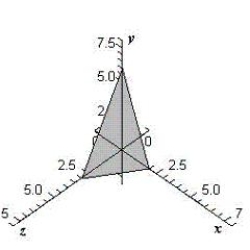
B)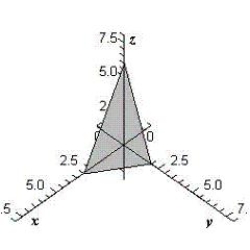
C)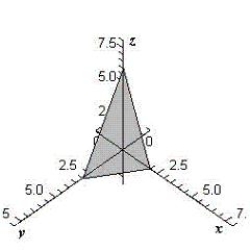
D)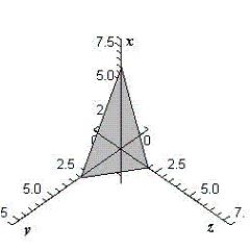
E)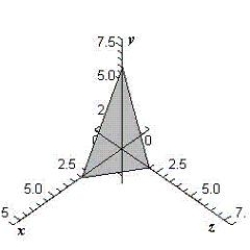
 .
.A)

B)

C)

D)

E)


فتح الحزمة
افتح القفل للوصول البطاقات البالغ عددها 173 في هذه المجموعة.
فتح الحزمة
k this deck
5
Find an equation of the tangent plane to the surface  at the point
at the point  .
.
A)
B)
C)
D)
E)
 at the point
at the point  .
.A)

B)

C)

D)

E)


فتح الحزمة
افتح القفل للوصول البطاقات البالغ عددها 173 في هذه المجموعة.
فتح الحزمة
k this deck
6
A cargo container (in the shape of a rectangular solid) must have a volume of 520 cubic feet. The bottom will cost $7 per square foot to construct and the sides and the top will cost $3 per square foot to construct. Use Lagrange multipliers to find the dimensions of the container of this volume that has minimum cost.
A)
B)
C)
D)
E)
A)

B)

C)

D)

E)


فتح الحزمة
افتح القفل للوصول البطاقات البالغ عددها 173 في هذه المجموعة.
فتح الحزمة
k this deck
7
According to the Ideal Gas Law,  , where P is pressure, V is volume, T is temperature (in Kelvins), and k is a constant of proportionality. A tank contains 2,500 cubic inches of nitrogen at a pressure of 30 pounds per square inch and a temperature of 700 K. Determine k.
, where P is pressure, V is volume, T is temperature (in Kelvins), and k is a constant of proportionality. A tank contains 2,500 cubic inches of nitrogen at a pressure of 30 pounds per square inch and a temperature of 700 K. Determine k.
A)
B)
C)
D)
E)
 , where P is pressure, V is volume, T is temperature (in Kelvins), and k is a constant of proportionality. A tank contains 2,500 cubic inches of nitrogen at a pressure of 30 pounds per square inch and a temperature of 700 K. Determine k.
, where P is pressure, V is volume, T is temperature (in Kelvins), and k is a constant of proportionality. A tank contains 2,500 cubic inches of nitrogen at a pressure of 30 pounds per square inch and a temperature of 700 K. Determine k. A)

B)

C)

D)

E)


فتح الحزمة
افتح القفل للوصول البطاقات البالغ عددها 173 في هذه المجموعة.
فتح الحزمة
k this deck
8
According to the Ideal Gas Law,  , where P is pressure, V is volume, T is temperature (in Kelvins), and k is a constant of proportionality. A tank contains 2500 cubic inches of nitrogen at a pressure of 36 pounds per square inch and a temperature of 700 K. Write P as a function of V and T after evaluating k.
, where P is pressure, V is volume, T is temperature (in Kelvins), and k is a constant of proportionality. A tank contains 2500 cubic inches of nitrogen at a pressure of 36 pounds per square inch and a temperature of 700 K. Write P as a function of V and T after evaluating k.
A)
B)
C)
D)
E)
 , where P is pressure, V is volume, T is temperature (in Kelvins), and k is a constant of proportionality. A tank contains 2500 cubic inches of nitrogen at a pressure of 36 pounds per square inch and a temperature of 700 K. Write P as a function of V and T after evaluating k.
, where P is pressure, V is volume, T is temperature (in Kelvins), and k is a constant of proportionality. A tank contains 2500 cubic inches of nitrogen at a pressure of 36 pounds per square inch and a temperature of 700 K. Write P as a function of V and T after evaluating k.A)

B)

C)

D)

E)


فتح الحزمة
افتح القفل للوصول البطاقات البالغ عددها 173 في هذه المجموعة.
فتح الحزمة
k this deck
9
Find  by using the limits
by using the limits  and
and  .
.
A)
B)
C)
D)
E)
 by using the limits
by using the limits  and
and  .
.A)

B)

C)

D)

E)


فتح الحزمة
افتح القفل للوصول البطاقات البالغ عددها 173 في هذه المجموعة.
فتح الحزمة
k this deck
10
Find the path of a heat-seeking particle placed at point  on a metal plate with a temperature field
on a metal plate with a temperature field  .
.
A)
B)
C)
D)
E)
 on a metal plate with a temperature field
on a metal plate with a temperature field  .
.A)

B)

C)

D)

E)


فتح الحزمة
افتح القفل للوصول البطاقات البالغ عددها 173 في هذه المجموعة.
فتح الحزمة
k this deck
11
The two radii of the frustum of a right circular cone are increasing at a rate of 7 centimeters per minute, and the height is increasing at a rate of 16 centimeters per minute (see figure). Find the rate at which the surface area is changing when the two radii are 19 centimeters and 24 centimeters, and the height is 8 centimeters. [Note: The surface area does not include the top and bottom circles.] Round your answer to two decimal places. ![<strong>The two radii of the frustum of a right circular cone are increasing at a rate of 7 centimeters per minute, and the height is increasing at a rate of 16 centimeters per minute (see figure). Find the rate at which the surface area is changing when the two radii are 19 centimeters and 24 centimeters, and the height is 8 centimeters. [Note: The surface area does not include the top and bottom circles.] Round your answer to two decimal places. </strong> A) B) C) D) E)](https://d2lvgg3v3hfg70.cloudfront.net/TB8527/11eb71ff_b4ca_54c0_8413_1baf9e28593d_TB8527_00.jpg)
A)![<strong>The two radii of the frustum of a right circular cone are increasing at a rate of 7 centimeters per minute, and the height is increasing at a rate of 16 centimeters per minute (see figure). Find the rate at which the surface area is changing when the two radii are 19 centimeters and 24 centimeters, and the height is 8 centimeters. [Note: The surface area does not include the top and bottom circles.] Round your answer to two decimal places. </strong> A) B) C) D) E)](https://d2lvgg3v3hfg70.cloudfront.net/TB8527/11eb71ff_b4ca_54c1_8413_85c8d89e0c9b_TB8527_11.jpg)
B)![<strong>The two radii of the frustum of a right circular cone are increasing at a rate of 7 centimeters per minute, and the height is increasing at a rate of 16 centimeters per minute (see figure). Find the rate at which the surface area is changing when the two radii are 19 centimeters and 24 centimeters, and the height is 8 centimeters. [Note: The surface area does not include the top and bottom circles.] Round your answer to two decimal places. </strong> A) B) C) D) E)](https://d2lvgg3v3hfg70.cloudfront.net/TB8527/11eb71ff_b4ca_54c2_8413_57afdde812e5_TB8527_11.jpg)
C)![<strong>The two radii of the frustum of a right circular cone are increasing at a rate of 7 centimeters per minute, and the height is increasing at a rate of 16 centimeters per minute (see figure). Find the rate at which the surface area is changing when the two radii are 19 centimeters and 24 centimeters, and the height is 8 centimeters. [Note: The surface area does not include the top and bottom circles.] Round your answer to two decimal places. </strong> A) B) C) D) E)](https://d2lvgg3v3hfg70.cloudfront.net/TB8527/11eb71ff_b4ca_54c3_8413_378fc2f0e24b_TB8527_11.jpg)
D)![<strong>The two radii of the frustum of a right circular cone are increasing at a rate of 7 centimeters per minute, and the height is increasing at a rate of 16 centimeters per minute (see figure). Find the rate at which the surface area is changing when the two radii are 19 centimeters and 24 centimeters, and the height is 8 centimeters. [Note: The surface area does not include the top and bottom circles.] Round your answer to two decimal places. </strong> A) B) C) D) E)](https://d2lvgg3v3hfg70.cloudfront.net/TB8527/11eb71ff_b4ca_54c4_8413_3d27838dd471_TB8527_11.jpg)
E)![<strong>The two radii of the frustum of a right circular cone are increasing at a rate of 7 centimeters per minute, and the height is increasing at a rate of 16 centimeters per minute (see figure). Find the rate at which the surface area is changing when the two radii are 19 centimeters and 24 centimeters, and the height is 8 centimeters. [Note: The surface area does not include the top and bottom circles.] Round your answer to two decimal places. </strong> A) B) C) D) E)](https://d2lvgg3v3hfg70.cloudfront.net/TB8527/11eb71ff_b4ca_7bd5_8413_2f3004243586_TB8527_11.jpg)
![<strong>The two radii of the frustum of a right circular cone are increasing at a rate of 7 centimeters per minute, and the height is increasing at a rate of 16 centimeters per minute (see figure). Find the rate at which the surface area is changing when the two radii are 19 centimeters and 24 centimeters, and the height is 8 centimeters. [Note: The surface area does not include the top and bottom circles.] Round your answer to two decimal places. </strong> A) B) C) D) E)](https://d2lvgg3v3hfg70.cloudfront.net/TB8527/11eb71ff_b4ca_54c0_8413_1baf9e28593d_TB8527_00.jpg)
A)
![<strong>The two radii of the frustum of a right circular cone are increasing at a rate of 7 centimeters per minute, and the height is increasing at a rate of 16 centimeters per minute (see figure). Find the rate at which the surface area is changing when the two radii are 19 centimeters and 24 centimeters, and the height is 8 centimeters. [Note: The surface area does not include the top and bottom circles.] Round your answer to two decimal places. </strong> A) B) C) D) E)](https://d2lvgg3v3hfg70.cloudfront.net/TB8527/11eb71ff_b4ca_54c1_8413_85c8d89e0c9b_TB8527_11.jpg)
B)
![<strong>The two radii of the frustum of a right circular cone are increasing at a rate of 7 centimeters per minute, and the height is increasing at a rate of 16 centimeters per minute (see figure). Find the rate at which the surface area is changing when the two radii are 19 centimeters and 24 centimeters, and the height is 8 centimeters. [Note: The surface area does not include the top and bottom circles.] Round your answer to two decimal places. </strong> A) B) C) D) E)](https://d2lvgg3v3hfg70.cloudfront.net/TB8527/11eb71ff_b4ca_54c2_8413_57afdde812e5_TB8527_11.jpg)
C)
![<strong>The two radii of the frustum of a right circular cone are increasing at a rate of 7 centimeters per minute, and the height is increasing at a rate of 16 centimeters per minute (see figure). Find the rate at which the surface area is changing when the two radii are 19 centimeters and 24 centimeters, and the height is 8 centimeters. [Note: The surface area does not include the top and bottom circles.] Round your answer to two decimal places. </strong> A) B) C) D) E)](https://d2lvgg3v3hfg70.cloudfront.net/TB8527/11eb71ff_b4ca_54c3_8413_378fc2f0e24b_TB8527_11.jpg)
D)
![<strong>The two radii of the frustum of a right circular cone are increasing at a rate of 7 centimeters per minute, and the height is increasing at a rate of 16 centimeters per minute (see figure). Find the rate at which the surface area is changing when the two radii are 19 centimeters and 24 centimeters, and the height is 8 centimeters. [Note: The surface area does not include the top and bottom circles.] Round your answer to two decimal places. </strong> A) B) C) D) E)](https://d2lvgg3v3hfg70.cloudfront.net/TB8527/11eb71ff_b4ca_54c4_8413_3d27838dd471_TB8527_11.jpg)
E)
![<strong>The two radii of the frustum of a right circular cone are increasing at a rate of 7 centimeters per minute, and the height is increasing at a rate of 16 centimeters per minute (see figure). Find the rate at which the surface area is changing when the two radii are 19 centimeters and 24 centimeters, and the height is 8 centimeters. [Note: The surface area does not include the top and bottom circles.] Round your answer to two decimal places. </strong> A) B) C) D) E)](https://d2lvgg3v3hfg70.cloudfront.net/TB8527/11eb71ff_b4ca_7bd5_8413_2f3004243586_TB8527_11.jpg)

فتح الحزمة
افتح القفل للوصول البطاقات البالغ عددها 173 في هذه المجموعة.
فتح الحزمة
k this deck
12
Find the minimum cost of producing 60,000 units of a product  , where x is the number of units of labor (at $80 per unit) and y is the number of units of capital (at $40 per unit). Round your answer to the nearest cent.
, where x is the number of units of labor (at $80 per unit) and y is the number of units of capital (at $40 per unit). Round your answer to the nearest cent.
A) $190,278.22
B) $62,746.50
C) $37,020.43
D) $112,264.15
E) $55,724.88
 , where x is the number of units of labor (at $80 per unit) and y is the number of units of capital (at $40 per unit). Round your answer to the nearest cent.
, where x is the number of units of labor (at $80 per unit) and y is the number of units of capital (at $40 per unit). Round your answer to the nearest cent.A) $190,278.22
B) $62,746.50
C) $37,020.43
D) $112,264.15
E) $55,724.88

فتح الحزمة
افتح القفل للوصول البطاقات البالغ عددها 173 في هذه المجموعة.
فتح الحزمة
k this deck
13
Sketch the level curves for the function  for the given c-values
for the given c-values  .
.
A)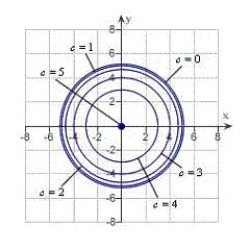
B)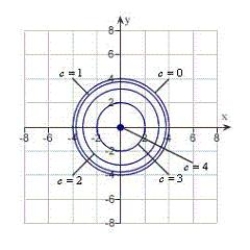
C)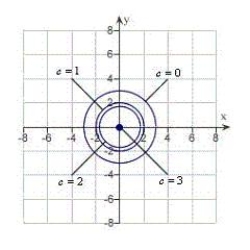
D)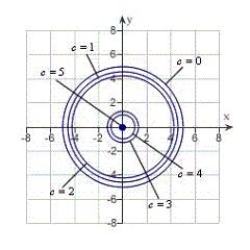
E)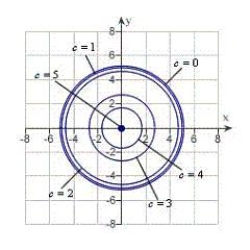
 for the given c-values
for the given c-values  .
.A)

B)

C)

D)

E)


فتح الحزمة
افتح القفل للوصول البطاقات البالغ عددها 173 في هذه المجموعة.
فتح الحزمة
k this deck
14
Use Lagrange multipliers to find the maximum value of  where
where  and
and  subject to the constraint
subject to the constraint  .
.
A) maxima: ; minima:
; minima: 
B) maxima: ; minima:
; minima: 
C) maxima: ; minima:
; minima: 
D) maxima: ; minima:
; minima: 
E) maxima: ; minima:
; minima: 
 where
where  and
and  subject to the constraint
subject to the constraint  .
. A) maxima:
 ; minima:
; minima: 
B) maxima:
 ; minima:
; minima: 
C) maxima:
 ; minima:
; minima: 
D) maxima:
 ; minima:
; minima: 
E) maxima:
 ; minima:
; minima: 

فتح الحزمة
افتح القفل للوصول البطاقات البالغ عددها 173 في هذه المجموعة.
فتح الحزمة
k this deck
15
Find symmetric equations of the normal line to the surface  at the point
at the point  .
.
A)
B)
C)
D)
E)
 at the point
at the point  .
.A)

B)

C)

D)

E)


فتح الحزمة
افتح القفل للوصول البطاقات البالغ عددها 173 في هذه المجموعة.
فتح الحزمة
k this deck
16
Describe the domain of the function  .
.
A)
B)
C)
D)
E)
 .
.A)

B)

C)

D)

E)


فتح الحزمة
افتح القفل للوصول البطاقات البالغ عددها 173 في هذه المجموعة.
فتح الحزمة
k this deck
17
Determine the continuity of the function  .
.
A) continuous except at
B) continuous except at
C) continuous except at
D) continuous except at
E) continuous everywhere
 .
.A) continuous except at

B) continuous except at

C) continuous except at

D) continuous except at

E) continuous everywhere

فتح الحزمة
افتح القفل للوصول البطاقات البالغ عددها 173 في هذه المجموعة.
فتح الحزمة
k this deck
18
Sketch the surface given by the function. 
A)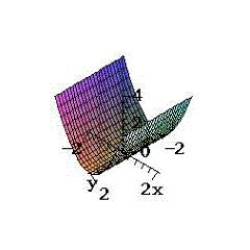
B)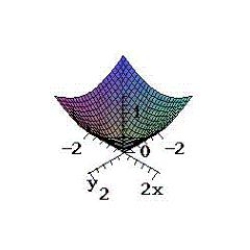
C)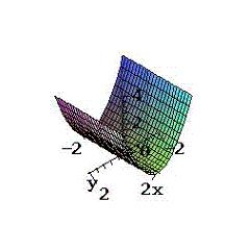
D)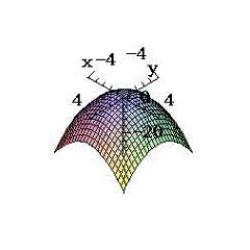
E) none of these

A)

B)

C)

D)

E) none of these

فتح الحزمة
افتح القفل للوصول البطاقات البالغ عددها 173 في هذه المجموعة.
فتح الحزمة
k this deck
19
Find the least squares regression line for the points shown in the graph. 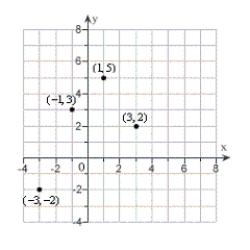
A)
B)
C)
D)
E)

A)

B)

C)

D)

E)


فتح الحزمة
افتح القفل للوصول البطاقات البالغ عددها 173 في هذه المجموعة.
فتح الحزمة
k this deck
20
Find the second partial derivative for the function  with respect to x.
with respect to x.
A)
B)
C)
D)
E)
 with respect to x.
with respect to x.A)

B)

C)

D)

E)


فتح الحزمة
افتح القفل للوصول البطاقات البالغ عددها 173 في هذه المجموعة.
فتح الحزمة
k this deck
21
Suppose the temperature at any point  in a steel plate is
in a steel plate is  where x and y are measured in meters. At the point
where x and y are measured in meters. At the point  find the rate of change of the temperature with respect to the distance moved along the plate in the direction of the x-axis. Round your answer to one decimal place.
find the rate of change of the temperature with respect to the distance moved along the plate in the direction of the x-axis. Round your answer to one decimal place.
A)
B)
C)
D)
E)
 in a steel plate is
in a steel plate is  where x and y are measured in meters. At the point
where x and y are measured in meters. At the point  find the rate of change of the temperature with respect to the distance moved along the plate in the direction of the x-axis. Round your answer to one decimal place.
find the rate of change of the temperature with respect to the distance moved along the plate in the direction of the x-axis. Round your answer to one decimal place. A)

B)

C)

D)

E)


فتح الحزمة
افتح القفل للوصول البطاقات البالغ عددها 173 في هذه المجموعة.
فتح الحزمة
k this deck
22
Examine the function  for relative extrema and saddle points.
for relative extrema and saddle points.
A) saddle point: ; relative minimum:
; relative minimum: 
B) saddle point: ; relative minimum:
; relative minimum: 
C) relative minimum: ; relative maximum:
; relative maximum: 
D) relative minimum: ; relative maximum:
; relative maximum: 
E) saddle points: ,
, 
 for relative extrema and saddle points.
for relative extrema and saddle points.A) saddle point:
 ; relative minimum:
; relative minimum: 
B) saddle point:
 ; relative minimum:
; relative minimum: 
C) relative minimum:
 ; relative maximum:
; relative maximum: 
D) relative minimum:
 ; relative maximum:
; relative maximum: 
E) saddle points:
 ,
, 

فتح الحزمة
افتح القفل للوصول البطاقات البالغ عددها 173 في هذه المجموعة.
فتح الحزمة
k this deck
23
Find symmetric equations of the tangent line to the curve of intersection of the surfaces  ,
,  at the point
at the point  .
.
A)
B)
C)
D)
E)
 ,
,  at the point
at the point  .
.A)

B)

C)

D)

E)


فتح الحزمة
افتح القفل للوصول البطاقات البالغ عددها 173 في هذه المجموعة.
فتح الحزمة
k this deck
24
Find symmetric equations of the normal line to the surface  at the point
at the point  .
.
A)
B)
C)
D)
E)
 at the point
at the point  .
.A)

B)

C)

D)

E)


فتح الحزمة
افتح القفل للوصول البطاقات البالغ عددها 173 في هذه المجموعة.
فتح الحزمة
k this deck
25
Find the absolute extrema of the function  over the triangular region in the xy-plane with vertices
over the triangular region in the xy-plane with vertices  and
and  .
.
A) absolute maximum: at
at  absolute minimum:
absolute minimum:  at
at  and along the line
and along the line 
B) absolute maximum: at
at  absolute minimum:
absolute minimum:  at
at  and along the line
and along the line 
C) absolute maximum: at
at  absolute minimum:
absolute minimum:  at
at  and along the line
and along the line 
D) absolute maximum: at
at  absolute minimum:
absolute minimum:  at
at 
E) absolute maximum: at
at  absolute minimum:
absolute minimum:  at
at 
 over the triangular region in the xy-plane with vertices
over the triangular region in the xy-plane with vertices  and
and  .
.A) absolute maximum:
 at
at  absolute minimum:
absolute minimum:  at
at  and along the line
and along the line 
B) absolute maximum:
 at
at  absolute minimum:
absolute minimum:  at
at  and along the line
and along the line 
C) absolute maximum:
 at
at  absolute minimum:
absolute minimum:  at
at  and along the line
and along the line 
D) absolute maximum:
 at
at  absolute minimum:
absolute minimum:  at
at 
E) absolute maximum:
 at
at  absolute minimum:
absolute minimum:  at
at 

فتح الحزمة
افتح القفل للوصول البطاقات البالغ عددها 173 في هذه المجموعة.
فتح الحزمة
k this deck
26
Find the partial derivative  for the function
for the function  .
.
A)
B)
C)
D)
E)
 for the function
for the function  .
.A)

B)

C)

D)

E)


فتح الحزمة
افتح القفل للوصول البطاقات البالغ عددها 173 في هذه المجموعة.
فتح الحزمة
k this deck
27
Find and simplify the function  at the given value
at the given value  .
.
A) -45
B) -18
C) 45
D) 18
E) 0
 at the given value
at the given value  .
.A) -45
B) -18
C) 45
D) 18
E) 0

فتح الحزمة
افتح القفل للوصول البطاقات البالغ عددها 173 في هذه المجموعة.
فتح الحزمة
k this deck
28
For function  , find the maximum value of the directional derivative at (3,2).
, find the maximum value of the directional derivative at (3,2).
A) /9
/9
B) /36
/36
C) /144
/144
D) /72
/72
E) /108
/108
 , find the maximum value of the directional derivative at (3,2).
, find the maximum value of the directional derivative at (3,2). A)
 /9
/9 B)
 /36
/36 C)
 /144
/144 D)
 /72
/72 E)
 /108
/108 
فتح الحزمة
افتح القفل للوصول البطاقات البالغ عددها 173 في هذه المجموعة.
فتح الحزمة
k this deck
29
Suppose the centripetal acceleration of a particle moving in a circle is  , where v is the velocity and r is the radius of the circle. Approximate the maximum percent error in measuring the acceleration due to errors of 7% in v and 5% in r.
, where v is the velocity and r is the radius of the circle. Approximate the maximum percent error in measuring the acceleration due to errors of 7% in v and 5% in r.
A) 23%
B) 25%
C) 19%
D) 40%
E) 24%
 , where v is the velocity and r is the radius of the circle. Approximate the maximum percent error in measuring the acceleration due to errors of 7% in v and 5% in r.
, where v is the velocity and r is the radius of the circle. Approximate the maximum percent error in measuring the acceleration due to errors of 7% in v and 5% in r. A) 23%
B) 25%
C) 19%
D) 40%
E) 24%

فتح الحزمة
افتح القفل للوصول البطاقات البالغ عددها 173 في هذه المجموعة.
فتح الحزمة
k this deck
30
Differentiate implicitly to find  , given
, given  .
.
A)
B)
C)
D)
E)
 , given
, given  .
. A)

B)

C)

D)

E)


فتح الحزمة
افتح القفل للوصول البطاقات البالغ عددها 173 في هذه المجموعة.
فتح الحزمة
k this deck
31
Determine the continuity of the function  .
.
A) continuous except at
B) continuous except at
C) continuous for all
D) continuous for all
E) continuous everywhere
 .
.A) continuous except at

B) continuous except at

C) continuous for all

D) continuous for all

E) continuous everywhere

فتح الحزمة
افتح القفل للوصول البطاقات البالغ عددها 173 في هذه المجموعة.
فتح الحزمة
k this deck
32
Find three positive numbers x, y, and z whose sum is 21 and the sum of the squares is a minimum.
A)
B)
C)
D)
E)
A)

B)

C)

D)

E)


فتح الحزمة
افتح القفل للوصول البطاقات البالغ عددها 173 في هذه المجموعة.
فتح الحزمة
k this deck
33
A company manufactures two types of sneakers: running shoes and basketball shoes. The total revenue from  units of running shoes and
units of running shoes and  units of basketball shoes is:
units of basketball shoes is:  ,
,
Where and
and  are in thousands of units. Find
are in thousands of units. Find  and
and  so as to maximize the revenue.
so as to maximize the revenue.
A)
B)
C)
D)
E)
 units of running shoes and
units of running shoes and  units of basketball shoes is:
units of basketball shoes is:  ,
,
Where
 and
and  are in thousands of units. Find
are in thousands of units. Find  and
and  so as to maximize the revenue.
so as to maximize the revenue.
A)

B)

C)

D)

E)


فتح الحزمة
افتح القفل للوصول البطاقات البالغ عددها 173 في هذه المجموعة.
فتح الحزمة
k this deck
34
Find and simplify the function  at the given value
at the given value  .
.
A)
B)
C)
D)
E)
 at the given value
at the given value  .
. A)

B)

C)

D)

E)


فتح الحزمة
افتح القفل للوصول البطاقات البالغ عددها 173 في هذه المجموعة.
فتح الحزمة
k this deck
35
The temperature at the point  on a metal plate is modeled by
on a metal plate is modeled by  ,
,  . Find the direction of greatest increase in heat from the point
. Find the direction of greatest increase in heat from the point  .
.
A) The greatest increase is in the direction of the gradient .
.
B) The greatest increase is in the direction of the gradient .
.
C) The greatest increase is in the direction of the gradient .
.
D) The greatest increase is in the direction of the gradient .
.
E) The greatest increase is in the direction of the gradient .
.
 on a metal plate is modeled by
on a metal plate is modeled by  ,
,  . Find the direction of greatest increase in heat from the point
. Find the direction of greatest increase in heat from the point  .
. A) The greatest increase is in the direction of the gradient
 .
.
B) The greatest increase is in the direction of the gradient
 .
.
C) The greatest increase is in the direction of the gradient
 .
.
D) The greatest increase is in the direction of the gradient
 .
.
E) The greatest increase is in the direction of the gradient
 .
.

فتح الحزمة
افتح القفل للوصول البطاقات البالغ عددها 173 في هذه المجموعة.
فتح الحزمة
k this deck
36
Find the directional derivative of the function at P in the direction of  .
. 
A) 30/
B) -10/
C) 6/
D) 46/
E) -46/
 .
. 
A) 30/

B) -10/

C) 6/

D) 46/

E) -46/


فتح الحزمة
افتح القفل للوصول البطاقات البالغ عددها 173 في هذه المجموعة.
فتح الحزمة
k this deck
37
Examine the function  for relative extrema and saddle points.
for relative extrema and saddle points.
A) saddle point:
B) relative minimum:
C) relative minimum:
D) saddle point:
E) saddle point:
 for relative extrema and saddle points.
for relative extrema and saddle points.A) saddle point:

B) relative minimum:

C) relative minimum:

D) saddle point:

E) saddle point:


فتح الحزمة
افتح القفل للوصول البطاقات البالغ عددها 173 في هذه المجموعة.
فتح الحزمة
k this deck
38
Find the directional derivative of the function  at
at  in the direction of
in the direction of  . Round your answer to two decimal places.
. Round your answer to two decimal places.
A) -8.02
B) -1.71
C) -5.67
D) -1.03
E) -5.14
 at
at  in the direction of
in the direction of  . Round your answer to two decimal places.
. Round your answer to two decimal places. A) -8.02
B) -1.71
C) -5.67
D) -1.03
E) -5.14

فتح الحزمة
افتح القفل للوصول البطاقات البالغ عددها 173 في هذه المجموعة.
فتح الحزمة
k this deck
39
Find the total differential for the function  .
.
A)
B)
C)
D)
E)
 .
.A)

B)

C)

D)

E)


فتح الحزمة
افتح القفل للوصول البطاقات البالغ عددها 173 في هذه المجموعة.
فتح الحزمة
k this deck
40
Find an equation of the tangent plane to the surface  at the point
at the point  .
.
A)
B)
C)
D)
E)
 at the point
at the point  .
. A)

B)

C)

D)

E)


فتح الحزمة
افتح القفل للوصول البطاقات البالغ عددها 173 في هذه المجموعة.
فتح الحزمة
k this deck
41
Determine the continuity of the function  .
.
A) continuous except at
B) continuous except at
C) continuous except at
D) continuous except at
E) continuous everywhere
 .
.A) continuous except at

B) continuous except at

C) continuous except at

D) continuous except at

E) continuous everywhere

فتح الحزمة
افتح القفل للوصول البطاقات البالغ عددها 173 في هذه المجموعة.
فتح الحزمة
k this deck
42
The material for constructing the base of an open box costs 1.5 times as much per unit area as the material for constructing the sides. For a fixed amount of money $400.00, find the dimensions of the box of largest volume that can be made.
A)
B)
C)
D)
E)
A)

B)

C)

D)

E)


فتح الحزمة
افتح القفل للوصول البطاقات البالغ عددها 173 في هذه المجموعة.
فتح الحزمة
k this deck
43
The temperature at the point  on a metal plate is modeled by
on a metal plate is modeled by  ,
,  . Find the directions of no change in heat on the plate from the point
. Find the directions of no change in heat on the plate from the point  .
.
A) There will be no change in directions perpendicular to the gradient .
.
B) There will be no change in directions parallel to the gradient .
.
C) There will be no change in directions parallel to the gradient .
.
D) There will be no change in directions perpendicular to the gradient .
.
E) There will be no change in directions perpendicular to the gradient .
.
 on a metal plate is modeled by
on a metal plate is modeled by  ,
,  . Find the directions of no change in heat on the plate from the point
. Find the directions of no change in heat on the plate from the point  .
.A) There will be no change in directions perpendicular to the gradient
 .
.B) There will be no change in directions parallel to the gradient
 .
.C) There will be no change in directions parallel to the gradient
 .
.D) There will be no change in directions perpendicular to the gradient
 .
.E) There will be no change in directions perpendicular to the gradient
 .
.
فتح الحزمة
افتح القفل للوصول البطاقات البالغ عددها 173 في هذه المجموعة.
فتح الحزمة
k this deck
44
The radius of a right circular cylinder is increasing at a rate of 8 inches per minute, and the height is decreasing at a rate of 6 inches per minute. What is the rate of change of the surface area when the radius is 16 inches and the height is 37 inches?
A)
B)
C)
D)
E)
A)

B)

C)

D)

E)


فتح الحزمة
افتح القفل للوصول البطاقات البالغ عددها 173 في هذه المجموعة.
فتح الحزمة
k this deck
45
Use Lagrange multipliers to minimize the function  subject to the following constraint.
subject to the following constraint. 
Assume that x, y, and z are positive.
A)
B)
C)
D)
E)
 subject to the following constraint.
subject to the following constraint. 
Assume that x, y, and z are positive.
A)

B)

C)

D)

E)


فتح الحزمة
افتح القفل للوصول البطاقات البالغ عددها 173 في هذه المجموعة.
فتح الحزمة
k this deck
46
Find the partial derivative  for the function
for the function  .
.
A)
B)
C)
D)
E)
 for the function
for the function  .
. A)

B)

C)

D)

E)


فتح الحزمة
افتح القفل للوصول البطاقات البالغ عددها 173 في هذه المجموعة.
فتح الحزمة
k this deck
47
Find the limit . 
A)
B)
C)
D)
E) 0

A)

B)

C)

D)

E) 0

فتح الحزمة
افتح القفل للوصول البطاقات البالغ عددها 173 في هذه المجموعة.
فتح الحزمة
k this deck
48
Given  , calculate
, calculate  by evaluating
by evaluating  and
and  . Round your answer to four decimal places.
. Round your answer to four decimal places.
A) -4.4276
B) -38.4276
C) -14.4276
D) 0.1448
E) 5.1448
 , calculate
, calculate  by evaluating
by evaluating  and
and  . Round your answer to four decimal places.
. Round your answer to four decimal places. A) -4.4276
B) -38.4276
C) -14.4276
D) 0.1448
E) 5.1448

فتح الحزمة
افتح القفل للوصول البطاقات البالغ عددها 173 في هذه المجموعة.
فتح الحزمة
k this deck
49
For  , evaluate
, evaluate  at the point
at the point  .
.
A)
B)
C)
D)
E)
 , evaluate
, evaluate  at the point
at the point  .
.A)

B)

C)

D)

E)


فتح الحزمة
افتح القفل للوصول البطاقات البالغ عددها 173 في هذه المجموعة.
فتح الحزمة
k this deck
50
Examine the function  for relative extrema.
for relative extrema.
A) relative maximum:
B) relative minimum:
C) relative maximum:
D) relative minimum:
E) no relative extrema
 for relative extrema.
for relative extrema.A) relative maximum:

B) relative minimum:

C) relative maximum:

D) relative minimum:

E) no relative extrema

فتح الحزمة
افتح القفل للوصول البطاقات البالغ عددها 173 في هذه المجموعة.
فتح الحزمة
k this deck
51
Find the first partial derivative for the function  with respect to z.
with respect to z.
A)
B)
C)
D)
E)
 with respect to z.
with respect to z.A)

B)

C)

D)

E)


فتح الحزمة
افتح القفل للوصول البطاقات البالغ عددها 173 في هذه المجموعة.
فتح الحزمة
k this deck
52
Find the partial derivative  for the function
for the function  .
.
A)
B)
C)
D)
E)
 for the function
for the function  .
. A)

B)

C)

D)

E)


فتح الحزمة
افتح القفل للوصول البطاقات البالغ عددها 173 في هذه المجموعة.
فتح الحزمة
k this deck
53
Use the gradient to find a normal vector to the graph of the equation at the given point. 
A)
B)
C)
D)
E)

A)

B)

C)

D)

E)


فتح الحزمة
افتح القفل للوصول البطاقات البالغ عددها 173 في هذه المجموعة.
فتح الحزمة
k this deck
54
Find  using the appropriate Chain Rule for
using the appropriate Chain Rule for  where
where  and
and  .
.
A) 104t
B) 52t
C) 80t
D) 44t
E) 156t
 using the appropriate Chain Rule for
using the appropriate Chain Rule for  where
where  and
and  .
. A) 104t
B) 52t
C) 80t
D) 44t
E) 156t

فتح الحزمة
افتح القفل للوصول البطاقات البالغ عددها 173 في هذه المجموعة.
فتح الحزمة
k this deck
55
Let  , where
, where  ,
,  , and
, and  . Find
. Find  .
.
A)
B)
C)
D)
E)
 , where
, where  ,
,  , and
, and  . Find
. Find  .
. A)

B)

C)

D)

E)


فتح الحزمة
افتح القفل للوصول البطاقات البالغ عددها 173 في هذه المجموعة.
فتح الحزمة
k this deck
56
Find the maximum value of the directional derivative at the point  of the function
of the function  . Round your answer to two decimal places.
. Round your answer to two decimal places.
A) 0.32
B) 0.14
C) 0.33
D) 0.10
E) 0.04
 of the function
of the function  . Round your answer to two decimal places.
. Round your answer to two decimal places.A) 0.32
B) 0.14
C) 0.33
D) 0.10
E) 0.04

فتح الحزمة
افتح القفل للوصول البطاقات البالغ عددها 173 في هذه المجموعة.
فتح الحزمة
k this deck
57
Suppose a corporation manufactures candles at two locations. The cost of producing  units at location 1 is
units at location 1 is  and the cost of producing
and the cost of producing  units at location 2 is
units at location 2 is  . The candles sell for $12 per unit. Find the quantity that should be produced at each location to maximize the profit
. The candles sell for $12 per unit. Find the quantity that should be produced at each location to maximize the profit  .
.
A)
B)
C)
D)
E)
 units at location 1 is
units at location 1 is  and the cost of producing
and the cost of producing  units at location 2 is
units at location 2 is  . The candles sell for $12 per unit. Find the quantity that should be produced at each location to maximize the profit
. The candles sell for $12 per unit. Find the quantity that should be produced at each location to maximize the profit  .
. A)

B)

C)

D)

E)


فتح الحزمة
افتح القفل للوصول البطاقات البالغ عددها 173 في هذه المجموعة.
فتح الحزمة
k this deck
58
A rectangular box with an open top has a length of x feet, a width of y feet, and a height of z feet. It costs $1.80 per square foot to build the base and $0.45 per square foot to build the sides. Write the cost C of constructing the box as a function of x, y, and z.
A)
B)
C)
D)
E)
A)

B)

C)

D)

E)


فتح الحزمة
افتح القفل للوصول البطاقات البالغ عددها 173 في هذه المجموعة.
فتح الحزمة
k this deck
59
Describe the domain of the function  .
.
A)
B)
C)
D)
E)
 .
.A)

B)

C)

D)

E)


فتح الحزمة
افتح القفل للوصول البطاقات البالغ عددها 173 في هذه المجموعة.
فتح الحزمة
k this deck
60
Let  represent the temperature at each point on the sphere
represent the temperature at each point on the sphere  . Find the maximum temperature on the curve formed by the intersection of the sphere and the plane
. Find the maximum temperature on the curve formed by the intersection of the sphere and the plane  .
.
A)
B)
C)
D)
E)
 represent the temperature at each point on the sphere
represent the temperature at each point on the sphere  . Find the maximum temperature on the curve formed by the intersection of the sphere and the plane
. Find the maximum temperature on the curve formed by the intersection of the sphere and the plane  .
.A)

B)

C)

D)

E)


فتح الحزمة
افتح القفل للوصول البطاقات البالغ عددها 173 في هذه المجموعة.
فتح الحزمة
k this deck
61
Differentiate implicitly to find  .
. 
A)
B)
C)
D)
E)
 .
. 
A)

B)

C)

D)

E)


فتح الحزمة
افتح القفل للوصول البطاقات البالغ عددها 173 في هذه المجموعة.
فتح الحزمة
k this deck
62
Find the limit  for the function
for the function  .
.
A) -4y
B) 0
C)
D) 4y
E) 4x
 for the function
for the function  .
. A) -4y
B) 0
C)

D) 4y
E) 4x

فتح الحزمة
افتح القفل للوصول البطاقات البالغ عددها 173 في هذه المجموعة.
فتح الحزمة
k this deck
63
Given  , use the total differential to approximate
, use the total differential to approximate  at
at  towards
towards  . Round your answer to four decimal places.
. Round your answer to four decimal places.
A) -32.5115
B) -0.0200
C) 25.4885
D) 2.9770
E) -9.5115
 , use the total differential to approximate
, use the total differential to approximate  at
at  towards
towards  . Round your answer to four decimal places.
. Round your answer to four decimal places. A) -32.5115
B) -0.0200
C) 25.4885
D) 2.9770
E) -9.5115

فتح الحزمة
افتح القفل للوصول البطاقات البالغ عددها 173 في هذه المجموعة.
فتح الحزمة
k this deck
64
For the function given by  describe the level surface given by
describe the level surface given by  .
.
A) sphere of radius 8 centered at the origin
B) circle of radius 8 centered at the origin
C) elliptic cone centered at the origin
D) sphere of radius 64 centered at the origin
E) right circular cone centered at the origin
 describe the level surface given by
describe the level surface given by  .
. A) sphere of radius 8 centered at the origin
B) circle of radius 8 centered at the origin
C) elliptic cone centered at the origin
D) sphere of radius 64 centered at the origin
E) right circular cone centered at the origin

فتح الحزمة
افتح القفل للوصول البطاقات البالغ عددها 173 في هذه المجموعة.
فتح الحزمة
k this deck
65
Find the highest point on the curve of intersection of the following surfaces. Cone:  , Plane:
, Plane: 
A)
B)
C)
D)
E)
 , Plane:
, Plane: 
A)

B)

C)

D)

E)


فتح الحزمة
افتح القفل للوصول البطاقات البالغ عددها 173 في هذه المجموعة.
فتح الحزمة
k this deck
66
Find the partial derivative  for the function
for the function  .
.
A)
B)
C)
D)
E)
 for the function
for the function  .
. A)

B)

C)

D)

E)


فتح الحزمة
افتح القفل للوصول البطاقات البالغ عددها 173 في هذه المجموعة.
فتح الحزمة
k this deck
67
Find the limit. 
A)
B)
C) 0
D) 1
E)

A)

B)

C) 0
D) 1
E)


فتح الحزمة
افتح القفل للوصول البطاقات البالغ عددها 173 في هذه المجموعة.
فتح الحزمة
k this deck
68
Examine the function  for relative extrema and saddle points.
for relative extrema and saddle points. 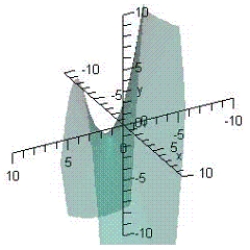
A) relative minimum:
B) relative minimum:
C) relative maximum:
D) saddle point:
E) saddle point:
 for relative extrema and saddle points.
for relative extrema and saddle points. 
A) relative minimum:

B) relative minimum:

C) relative maximum:

D) saddle point:

E) saddle point:


فتح الحزمة
افتح القفل للوصول البطاقات البالغ عددها 173 في هذه المجموعة.
فتح الحزمة
k this deck
69
Sketch the level curves of the function  for the given c-values
for the given c-values  .
.
A)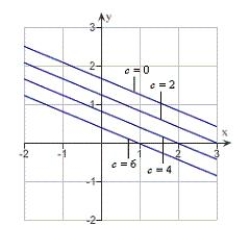
B)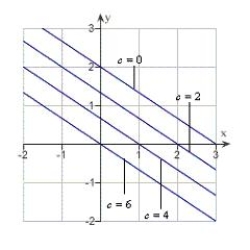
C)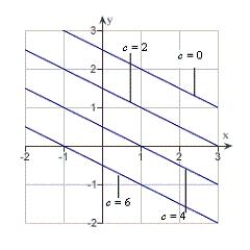
D)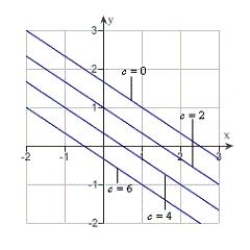
E)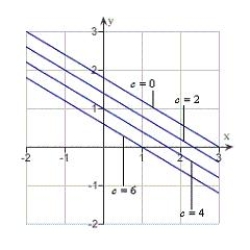
 for the given c-values
for the given c-values  .
.A)

B)

C)

D)

E)


فتح الحزمة
افتح القفل للوصول البطاقات البالغ عددها 173 في هذه المجموعة.
فتح الحزمة
k this deck
70
Find  using the appropriate Chain Rule for
using the appropriate Chain Rule for  where
where  and
and  , and evaluate the partial derivative at
, and evaluate the partial derivative at  and
and  . Round your answer to two decimal places.
. Round your answer to two decimal places.
A) 1,210.01
B) 806.73
C) 1,210.16
D) 806.71
E) 1,209.34
 using the appropriate Chain Rule for
using the appropriate Chain Rule for  where
where  and
and  , and evaluate the partial derivative at
, and evaluate the partial derivative at  and
and  . Round your answer to two decimal places.
. Round your answer to two decimal places. A) 1,210.01
B) 806.73
C) 1,210.16
D) 806.71
E) 1,209.34

فتح الحزمة
افتح القفل للوصول البطاقات البالغ عددها 173 في هذه المجموعة.
فتح الحزمة
k this deck
71
Determine the continuity of the function  .
.
A) continuous except at
B) continuous for
C) continuous except at
D) continuous except at
E) continuous for
 .
.A) continuous except at

B) continuous for

C) continuous except at

D) continuous except at

E) continuous for


فتح الحزمة
افتح القفل للوصول البطاقات البالغ عددها 173 في هذه المجموعة.
فتح الحزمة
k this deck
72
Suppose the utility function  is a measure of the utility (or satisfaction) derived by a person from the consumption of two products x and y. Determine the marginal utility of product x if the utility function is
is a measure of the utility (or satisfaction) derived by a person from the consumption of two products x and y. Determine the marginal utility of product x if the utility function is  .
.
A)
B)
C)
D)
E)
 is a measure of the utility (or satisfaction) derived by a person from the consumption of two products x and y. Determine the marginal utility of product x if the utility function is
is a measure of the utility (or satisfaction) derived by a person from the consumption of two products x and y. Determine the marginal utility of product x if the utility function is  .
. A)

B)

C)

D)

E)


فتح الحزمة
افتح القفل للوصول البطاقات البالغ عددها 173 في هذه المجموعة.
فتح الحزمة
k this deck
73
The parametric equations for the paths of two projectiles are given below. At what rate is the distance between the two objects changing at  ? Round your answer to two decimal places.
? Round your answer to two decimal places. 

A) -1.15
B) -1.94
C) -0.77
D) -4.95
E) -2.76
 ? Round your answer to two decimal places.
? Round your answer to two decimal places. 

A) -1.15
B) -1.94
C) -0.77
D) -4.95
E) -2.76

فتح الحزمة
افتح القفل للوصول البطاقات البالغ عددها 173 في هذه المجموعة.
فتح الحزمة
k this deck
74
Use the gradient to find the directional derivative of the function at P in the direction of Q. 
A)
B)
C)
D)
E)

A)

B)

C)

D)

E)


فتح الحزمة
افتح القفل للوصول البطاقات البالغ عددها 173 في هذه المجموعة.
فتح الحزمة
k this deck
75
Find the minimum distance from the point  to the plane
to the plane  .
.
A)
B)
C)
D)
E)
 to the plane
to the plane  .
.A)

B)

C)

D)

E)


فتح الحزمة
افتح القفل للوصول البطاقات البالغ عددها 173 في هذه المجموعة.
فتح الحزمة
k this deck
76
Use Lagrange multipliers to minimize the function  subject to the following two constraints.
subject to the following two constraints. 
 Assume that x, y, and z are nonnegative.
Assume that x, y, and z are nonnegative.
A)
B)
C)
D)
E)
 subject to the following two constraints.
subject to the following two constraints. 
 Assume that x, y, and z are nonnegative.
Assume that x, y, and z are nonnegative.A)

B)

C)

D)

E)


فتح الحزمة
افتح القفل للوصول البطاقات البالغ عددها 173 في هذه المجموعة.
فتح الحزمة
k this deck
77
Use Lagrange multipliers to find the maximum value of  where
where  and
and  , subject to the constraint
, subject to the constraint  .
.
A)
B)
C)
D)
E)
 where
where  and
and  , subject to the constraint
, subject to the constraint  .
. A)

B)

C)

D)

E)


فتح الحزمة
افتح القفل للوصول البطاقات البالغ عددها 173 في هذه المجموعة.
فتح الحزمة
k this deck
78
Use polar coordinates to find the limit.

فتح الحزمة
افتح القفل للوصول البطاقات البالغ عددها 173 في هذه المجموعة.
فتح الحزمة
k this deck
79
Given  , use the total differential to approximate
, use the total differential to approximate  at
at  towards
towards  . Round your answer to two decimal places.
. Round your answer to two decimal places.
A) 4.08
B) -10.92
C) 40.08
D) 22.16
E) 25.16
 , use the total differential to approximate
, use the total differential to approximate  at
at  towards
towards  . Round your answer to two decimal places.
. Round your answer to two decimal places. A) 4.08
B) -10.92
C) 40.08
D) 22.16
E) 25.16

فتح الحزمة
افتح القفل للوصول البطاقات البالغ عددها 173 في هذه المجموعة.
فتح الحزمة
k this deck
80
Suppose a pharmaceutical corporation has two plants that produce the same over-the-counter medicine. If  and
and  are the numbers of units produced at plant 1 and plant 2, respectively, then the total revenue for the product is given by
are the numbers of units produced at plant 1 and plant 2, respectively, then the total revenue for the product is given by  . When
. When  and
and  find the marginal revenue
find the marginal revenue  for plant 1.
for plant 1.
A) 127
B) 125
C) 56
D) 104
E) 70
 and
and  are the numbers of units produced at plant 1 and plant 2, respectively, then the total revenue for the product is given by
are the numbers of units produced at plant 1 and plant 2, respectively, then the total revenue for the product is given by  . When
. When  and
and  find the marginal revenue
find the marginal revenue  for plant 1.
for plant 1. A) 127
B) 125
C) 56
D) 104
E) 70

فتح الحزمة
افتح القفل للوصول البطاقات البالغ عددها 173 في هذه المجموعة.
فتح الحزمة
k this deck








